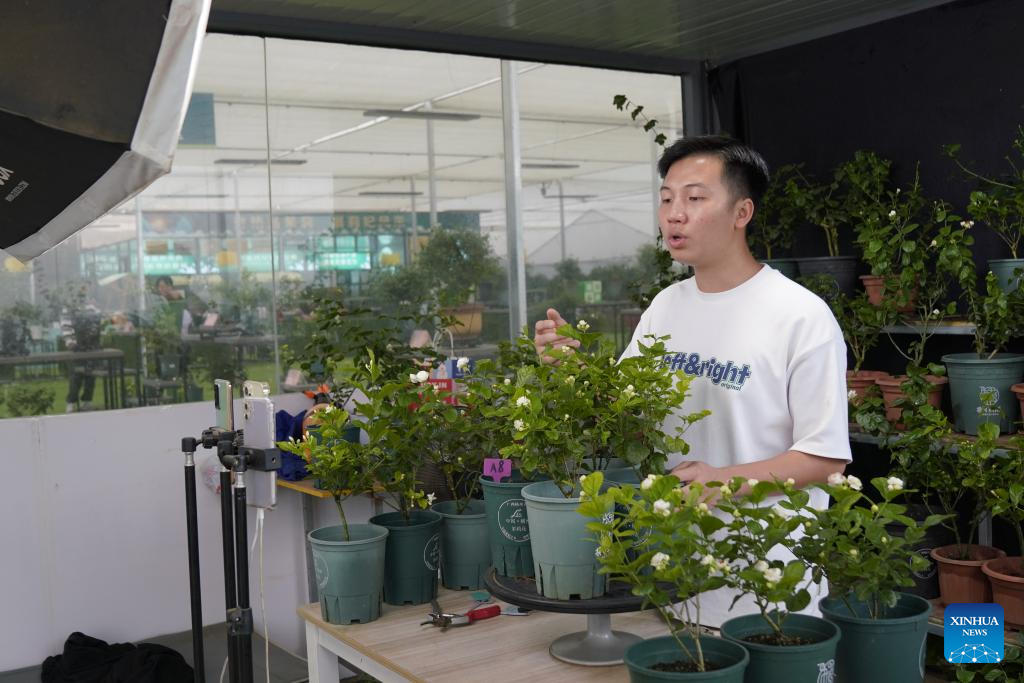
Mo Dianjin sells jasmine potted plants via livestream at a jasmine planting base in Hengzhou, south China's Guangxi Zhuang Autonomous Region, May 10, 2024. (Xinhua/Zhao Huan)
NANNING, June 12 (Xinhua) -- The iconic Chinese folk song Jasmine Flower begins with the lyric "Beautiful jasmine flower." In Hengzhou City, known for cultivating 60 percent of the world's jasmine flowers, visitors are greeted with banners reading "Beautiful Hengzhou jasmine flower."
The beautiful white flowers, propelled by the surge of e-commerce that seamlessly connects cultivators with consumers, have created a thriving industry for the city in south China's Guangxi Zhuang Autonomous Region. Additionally, the industry has enticed young locals to return and start businesses in their hometown.
Hengzhou, dubbed the "hometown of jasmine in China," boasts over 80 percent of the country's total output of both jasmine flowers and jasmine tea. It's home to over 330,000 jasmine flower farmers and over 130,000 mu (about 8,666.67 hectares) of jasmine fields. Amid the rapidly evolving e-commerce landscape, livestreaming has emerged as a new driver for the sales of jasmine products.
In a cosy 12 square meter room, Mo Dianjin stood surrounded by blooming jasmine potted plants. In front of a cellphone camera, he meticulously presented each plant he held, providing detailed explanations to his livestream viewers.
"The fresh and fragrant scent of jasmine makes it a beloved home adornment. Through livestreaming, I can sell nearly 20 pots of jasmine a day. This has been made possible thanks to our stable customer base," said Mo, a senior student from Guangxi Economic and Trade Vocational Institute majoring in e-commerce. He is currently interning at a jasmine planting base in Hengzhou.
Thanks to the expansive reach of e-commerce and robust consumer demand, the jasmine industry in Hengzhou has diversified from the traditional duo of flowers and tea. It now offers a wide array of products that have boosted its added value, including potted plants, jasmine related foods and medicinal items.
Bi Donghai, general manager of the jasmine planting base Mo interns at, sources premium jasmine seedlings and old roots from local farmers, cultivating and processing them into jasmine potted plants and bonsai. Through livestreaming and online platforms, jasmine potted plants can be distributed nationwide.
A livestreamer can achieve sales exceeding 1,000 yuan (about 140.58 U.S. dollars) per day, with top performers earning a monthly income exceeding 10,000 yuan, said Bi, adding the promising financial prospect has attracted young locals to work in the industry and even drawn back those previously seeking employment outside Hengzhou.
Chen Rilian is one of the retired businessmen. "During my time working in the city Hangzhou, the frontrunner in China's e-commerce landscape, I stumbled upon this industry. So I decided to leverage e-commerce to expand the reach of jasmine flowers and tea in my hometown," said Chen, now the owner of a tea company in Hengzhou, reflecting on his decision to venture into e-commerce upon returning to Hengzhou in 2011.
Chen acknowledged that the early days of his entrepreneurial journey were tough due to the limited awareness of e-commerce at that time. "As they watched me purchase numerous sets of computers, my friends and family thought I was about to start an internet café."
However, through perseverance, Chen has made great progress, to the extent where he now runs his own tea processing factory and has established his own brand.
To aid more farmers in transitioning and diversifying their sales channels, Hengzhou organized various training activities to cultivate young e-commerce talents for rural industrial development and promote local products.
The number of e-commerce businesses in Hengzhou has now surpassed 6,500, an increase of over 100 compared to the same period last year. Huang Zhenwu, a local official responsible for the e-commerce business, noted that this surge has infused new vitality into rural economic development.
In 2023, the city witnessed a whopping 6.695 billion yuan in e-commerce transactions, marking a year-on-year increase of 12.17 percent. Notably, online retail sales hit 2.73 billion yuan, creating jobs and business start-ups for over 19,000 people.
The robust expansion of the e-commerce business has also spurred the enhancement of express logistics networks. In March 2023, the city's logistics express joint distribution center commenced operations. Through closer collaboration with express logistics platforms, the transportation costs of agricultural produces have continued to fall.
"We are currently promoting the use of AI digital human livestreaming technology across our entire jasmine industry chain. This not only reduces labor costs, but also improves operational efficiency," said Huang. ■



